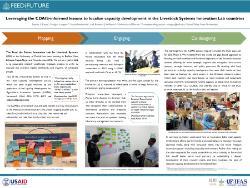Local Capacity Development
In Phase 2 (2020-2025), we will be moving from what we call Capacity 1.0 which focuses on particular types of technical and soft skills, such as lab management, statistical analysis, teaching, communication skills, etc. to Capacity 2.0. USAID’s forthcoming approach to local capacity development (LCD) argues that every organization has a system that needs to be appreciated. Previous efforts often focused on improving an organization’s ability to manage USAID projects and directives and less on strengthening system capacity. Capacity 2.0, then, is a combination of Capacity 1.0 focused on management, governance, strategic planning, monitoring, evaluation and learning, plus collaboration and creating social value through organizational and institutional strengthening.
Going forward, our focus will be on the capabilities of various livestock research organizations (collective ability) and competencies (of individuals within the broader research organization system) and apply LCD systems-wide approaches to engage policy and key decision makers to support and sustain changes in the system.
The priorities in Phase 2 will focus on:
- Launching and continuing collaborative/consultative meetings with LCD partners and stakeholders,
- Co-designing and implementing LCD pilot projects to address systemic issues in the livestock research systems, and
- Providing technical support to our LCD partners and collaborating with AOI and CCT leaders.

The LCD team is led by Dr. Nargiza Ludgate, Research Assistant Scientist at the Agricultural and Biological Engineering Department, IFAS.




-IMAGE-250x188.jpg)


